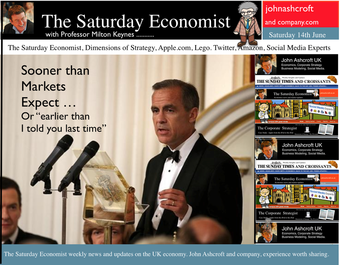 The first rate hike - it could happen sooner than markets expect … speaking at the Mansion House this week, Mark Carney gave a clear indication UK rates could be hiked this year. “It could happen sooner than markets expect”, the exact wording. A bit tough on the markets, they had placed great confidence in forward guidance. So much for the “unemployment trigger” or the “eighteen indicators” - “watch my lips”, the Governor’s new condition precedent. Last week we suggested - UK rates would have to rise sooner than forward guidance implied. We didn’t have long to wait. The Governor made the move. The markets now believe rates may rise in the final quarter of this year. October would be a fair bet. UK data continues to suggest rates should rise in the Autumn … Construction output increased by a revised 6.7% in the first quarter of the year and by 4.7% in April. We are forecasting growth of almost 6% this year and 5% in 2015. Our forecast for GDP growth is upgraded slightly to 3% from 2.9% this year, as a result of the revisions to the construction data. [Our forecast is unchanged for 2015 - 2.8%]. Manufacturing output increased by 4.4% in April following growth of 3.6% in the first quarter. A strong performance in capital goods output was supported by growth in consumer durables. The march of the makers is picking up the pace but output remains just over 7% below the peak level of 2008. We continue to forecast a recovery with growth of 4% this year. Jobs Data - another strong performance revealed this week. The claimant count fell by 27,000 to 1,086 thousand in May. The reduction over the last three months was 86,000. The average claimant count from 2005 to the middle of 2008 was 880,000. If current trends persist, the pre recession levels will be achieved by the end of the year and job centres will be closing by the end of 2017! The number of vacancies increased to 637,000. This is higher than the average pre recession levels of 634,000. The UV ratio fell to 1.7 from a peak of 3.8 in 2009. The average 2005 - 2008 was 1.4. 33 million are in work [DYDC], an increase of over one million over the last twelve months. Our estimate of spare capacity is 0.6%, compared to the estimates of 1% - 1.5% within the Bank of England. The margin is wafer thin. The “gap” will be exhausted by the final quarter of the year. The labour market is tightening. Rates should be set to rise towards the end of the year. So what happened to sterling this week? The pound closed up against the dollar following the comments from the Governor, encountering resistance at the $1.70 level. Sterling closed up at $1.696 from $1.679, up against the Euro at 1.253 (1.231). The Euro softened against the dollar at 1.353 from 1.364. Oil Price Brent Crude closed up at $113.07 from $108.48. The situation in Iraq and the Middle East pushed prices higher. The average price in June last year was $102.92. The inflation impact cannot be ignored if the a-seasonal pattern persists. Markets, closed down on fears of the rate hike in the UK and in the USA. The Dow closed down at 16,776 from 16,899 and the FTSE was also down 6,790 from 6,858. UK Ten year gilt yields rallied at 2.77 (2.63) and US Treasury yields closed at 2.77 from 2.55 on interest rate trends. Gold moved higher on geo political fears at $1,274 from $1,250. That’s all for this week. Visit the revamped web site. Download our quarterly forecast. Join the mailing list for The Saturday Economist or forward to a friend. John © 2014 The Saturday Economist by John Ashcroft and Company. Experience worth sharing. The material is based upon information which we consider to be reliable but we do not represent that it is accurate or complete and it should not be relied upon as such. We accept no liability for errors, or omissions of opinion or fact. In particular, no reliance should be placed on the comments on trends in financial markets. The receipt of this email should not be construed as the giving of investment advice.
0 Comments
Leave a Reply. |
The Saturday EconomistAuthorJohn Ashcroft publishes the Saturday Economist. Join the mailing list for updates on the UK and World Economy. Archives
July 2024
Categories
All
|
| The Saturday Economist |
The material is based upon information which we consider to be reliable but we do not represent that it is accurate or complete and it should not be relied upon as such. We accept no liability for errors, or omissions of opinion or fact. In particular, no reliance should be placed on the comments on trends in financial markets. The presentation should not be construed as the giving of investment advice.
|
The Saturday Economist, weekly updates on the UK economy.
Sign Up Now! Stay Up To Date! | Privacy Policy | Terms and Conditions | |
 RSS Feed
RSS Feed